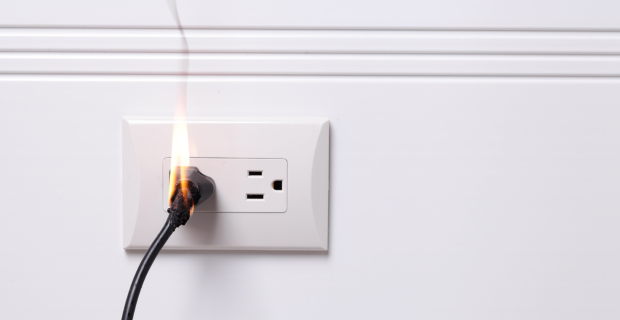Date Published: 2023/06/12
Read Time: mins
How to Prevent Electrical Fires At Home

Did you know that electrical issues are one of the primary causes of house fires in Canada? A lack of electrical maintenance and poorly installed electrical equipment can cause a fire that not only severely damages the house structure, but can lead to injuries and in some unfortunate instances, even death.
Here is a useful guide for preventing house fires of this kind.
Good Habits
In addition to maintenance, there are some habits you could adopt that would reduce the risk of fire in your home. Here are a few important ones:
- Unplug appliances when not in use. A plugged-in appliance can overheat and cause a fire, especially items like toasters or curling irons. It will also save a little on your electric bill.
- We all need extension cords now and then, but you should not use them permanently. Use them for a short time and add an outlet if you have to.
- Do not cut off the third prong on an electrical cord. This is the ground and is needed to operate efficiently.
- If your electrical cord is damaged, replace the cord. Do not plug in an appliance with a damaged cord.
- It may sound simple, but it is important to read instructions that come with your devices. There may be minor things you need to pay attention to that will be discussed, that could prevent a major problem.
- If your electrical system is very old, consider updating the system. Wiring can deteriorate and could overheat. Many older homes were set up for 60 amp systems, and most modern homes need 100 amps for maximum safety.
- Don’t ignore warning signs. If there are burn marks, or if the power cord feels unusually hot, there may be a problem. If you see sparks or feel a shock while touching the cord, which could also be a sign of trouble. If the breakers trip often, there could be a problem. These things will only get worse and should be checked if any warning signs appear.
- Label circuit breakers and fuses clearly as to what outlet or appliance it is connected to.
Good Maintenance
It’s important to keep in mind that when houses are built, they are built to a certain electrical safety code. So, naturally, as time changes, needs change, and what was once considered within this certain safety code, may no longer be considered safe. Not to mention, wiring and other materials connected to your home’s electrical system can also wear and deteriorate over time, and if you happen to be adding more load to the deteriorating system, you’re creating a system that could lead to an electrical fire.
This is why maintenance is key in prevention. Here are some things that should be checked on regularly:
- Don’t let cords or wiring get covered up. A cord can overheat and cause a fire if something is on top of it.
- Check any appliances that could be easily damaged or subject to a lot of heat or moisture.
- Any temporary wiring.
- Any component that was not properly installed can still work, but should be watched carefully.
Some Other Areas to Pay Attention To:
It is a good idea to make sure you have the correct wiring in your house, especially if your house has changed. There are circuit breakers and fuses to help avoid overloads, but it is important that the wire size is what it is supposed to be.
Motors, lights, and switches can ignite a fire if there is a lot of dust or the right combination of dust and other things in the air. It is a good idea to contact an electrical contractor to determine if you need explosion or ignition proof components.
Preventative maintenance is another area where you can prevent fires. Check receptacles and switches regularly, as well as the wiring for signs of wear and deterioration. A trained technician can use thermal infrared imaging to find hot spots that may be lurking inside your house.
While prevention is the best policy when it comes to avoiding fires, they may still happen. This is why it is a good idea to make sure you have the insurance you need, to protect your home and your family. Contact us today to make sure that you have the correct coverage.